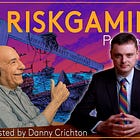Revisiting Jonathan Haidt on American structural stupidity and the post-Babel world
Free speech, campus politics, and social media
Today, we kick off a special two-part look-back at our conversations with Jonathan Haidt.
Haidt, who co-wrote the book “The Coddling of the American Mind: How Good Intentions and Bad Ideas Are Setting Up a Generation for Failure” and also co-founded the Heterodox Academy, also wrote an extended essay in The Atlantic on “Why the Past 10 Years of American Life Have Been Uniquely Stupid.”
In this first part, originally recorded in 2022, our own Josh Wolfe sat down with Jonathan to discuss structural stupidity, the United States after Babel, free speech, and campus politics.
This interview has been edited for length and clarity. For more of the conversation, subscribe to the Riskgaming podast.
Josh Wolfe:
I want to start with your 2022 essay for The Atlantic entitled Why the Past 10 Years of American Life Have Been Uniquely Stupid, which begs the question: Why have the past 10 years of American life been uniquely stupid?
Jonathan Haidt:
So I've had this sense that things have gone haywire since about 2014, when my friend Greg Lukianoff came to me and said, “John things are going haywire in a weird way on campus. I've been trying to figure out what’s changed, what's different.”
Americans aren't getting stupider. But if you put a bunch of us together in a university or anywhere else, we have become stupider because we're afraid to speak up.
As a social psychologist, what I've come to see — what I've come to believe — is that social media is different from everything else that came before. It's not just about how information moves. It's actually changed social relationships and the degree to which we’re afraid of each other. It's the ability to attack people — shame them, call them names — anytime, anywhere with no context, no accountability.
It's low-level intimidation that has made many people go quiet. And when we lose dissent — when you have an organization or a group, a classroom, a company in which people are afraid to challenge the prevailing wisdom, or the dominant view — then you get structural stupidity. Americans aren't getting stupider. But if you put a bunch of us together in a university or anywhere else, we have become stupider because we're afraid to speak up.
Josh Wolfe:
There's this German philosopher, and I forget the name, but the idea was the Spiral of Silence.
Jonathan Haidt:
Yes. This is an incredibly powerful concept from Elisabeth Noelle Neumann. She was a West German political scientist. What she argued is that our minds have a “quasi-statistical organ” to measure public opinion.
We're really sensitive to what people around us think. You watch a movie and you kind of want to get a sense, before you criticize it or praise it, what the general prevailing opinion is. So we're really good at that. We've been good at that for a million years.
Josh Wolfe:
Socially sampling the people around us.
Jonathan Haidt:
That's right. So she was talking about how mass media, and this is right in the 1970s, can distort things. Let's say you're in a politically radical time and the moderates say things you can say, but they're right on the edge. If somebody attacks them, they go silent. And now actually everyone's quasi-statistical organ picks up that the range of permissible opinion is further to the extreme than it was.
Well, now you've got a new set of moderates. And if somebody attacks them, they go silent. And before you know it, you have this spiral. Let’s say a cycle was a week or two back then. Over the course of several cycles — a few months — opinion compresses.
Now add in social media, where it's not a cycle of weeks or months. It can be a cycle of hours or days. So you can get very, very rapid movements where some opinion that was perfectly legitimate one day is a justification for being fired the next.
Josh Wolfe:
One of the things we see in markets is a phenomenon of bubbles and busts. These things happen because there is a proverbial diversity breakdown. Everybody's going to one side or the other. If differing views are muted or socially suppressed, you get a tipping point of diversity breakdown.
I remember a piece of yours from many years ago, when you started diagnosing micro aggressions on campus. Can you walk us through that element of this story?
Jonathan Haidt:
The piece you're thinking of is the original article, “The Coddling of the American Mind,” which Greg and I wrote. It came out in The Atlantic in August of 2015.
You know, from about 380BC until about 2013, it was actually good to be provocative. We were supposed to provoke. That's what Socrates did.
What that was about the new moral culture that emerged on campus in 2014, which was not there in 2012. It was an incredibly sudden shift. I've been a professor since 1995. I love being a professor. I love academic gatherings where you're around smart people who come up with provocative ideas. You know, from about 380BC until about 2013, it was actually good to be provocative. We were supposed to provoke. That's what Socrates did.
Josh Wolfe:
The university was the safe space.
Jonathan Haidt:
It was a safe space to try out ideas. And the idea was, if you say something and I punch you in the face, then I’m out — that was such a violation. But if you say something and I argue back and say that I think you're wrong, and here is why… well, that's the basic game, and it's fun.
We had that my whole career up until 2014, and all of a sudden there were students saying, you know, if you disagree with me on this, if you bring in this speaker, this is not just something that I will argue against. In fact, I won't argue against it. This is an act of aggression. This is an act of hatred.
We couldn't understand it. The first person who diagnosed it was Greg who, in cognitive behavioral therapy, had learned to identify about 15 different distortions. One of them is labeling: Someone says something and you say, well, you know, I'm a loser or you're an idiot. This is a label. This is not an argument. Well, all of a sudden, in 2014 some students started labelling, well, that's fascist.
Josh Wolfe:
I'm curious why 2014? Why not 2012? I mean most social phenomena are very slow building.
Jonathan Haidt:
The way to understand it is to go back to the early days of the internet when everything was boundless possibility, and it was magic and fun. You get the early social media platforms — Facebook, Myspace, Friendster. They come around 2003–04 and are non-toxic. You put up your posts, you linked to other people's posts.
Then, the news feed comes in. That's where things begin to get more toxic. Because now it's not about your bar mitzvah. It's about the stupid thing that somebody said and can you believe this? And then the big change that we trace out is the introduction in 2009 of the like button and the retweet button. This gives us much more virality.
I mean, if one person is angry about something, and they send it to their 500 followers and those followers each have 500 followers, before you know it, you've got millions of angry people. So in 2009, the dynamic really changes. But the world doesn't go insane in 2009. It takes a while for these to roll out to multiple platforms and all devices.
Something I learned after the article was published was about threaded comments. So before then, if Barack Obama posted something and he had 30 million followers and some nobody calls him a Muslim. Whatever. They said that in the comments, and it gets washed away. But after threaded comments, Facebook says, do you want to reply to this? And before you know it, you can have a fight over nothing. The more outrageous your comment, the more likely you are to get noticed. So I think it's kind of building, and building and then threaded comments add on in 2013.
This is exactly when Greg comes to talk to me to say weird stuff is happening on campus.
Josh Wolfe:
And Greg is a prime advocate for free speech.
Jonathan Haidt:
That's right. He’s been fighting for free speech rights for students since around 2001.
Josh Wolfe:
And free speech obviously is critical to everything. I mean, markets function because you have somebody that is long or somebody that is short. They have the right to express that view in the public sphere, the ability to come up with some crazy conjecture, to criticize. That is how we ultimately get progress.
Jonatha Haidt:
That's right. Although I think it's important to clarify what free speech means. Many people seem to think it means you can say anything anywhere, including racial slurs or obscenities. That's not what it means.
Of course, we don't want the government putting people in jail for what they say. But the speech norms we need on campus are not that anyone can say anything at any time. On campus, our purpose is to find truth, to learn methods of scholarship, debate, discovery that lead us to a better understanding of the world and each other. And so the norms we need are that if someone says something, you absolutely must protect the right to challenge it.
In 2015, one student told our previous executive director, “my motto is silence is safer.” That is a horrible motto for a college student.
I think we know what it would be like to live in Babylon the day after its destruction because that's what it's like to be an American now.
Josh Wolfe:
What is the solve for that asymmetry? Because on one hand, you are democratizing and giving people power to report things that are. But what is this all for?
Jonathan Haidt:
Well, there is no solve. We'd have to dig a lot deeper in this conversation and get into an economy of prestige and reputation. We'd have to talk about the need for norms.
But there's no longer a possibility of sharing an overarching narrative or an overarching set of norms. I opened the original article with the best metaphor I have found to explain what the hell is going on: the biblical story of Babel in Genesis 11. Everybody has the idea that people built a tower and then God knocked it over to punish them.
But actually, God doesn't knock over the tower. He's offended by the hubris of humanity. And he says, let us go down and confuse their language, so that they may not understand one another, and then he scatters them abroad on the face of the Earth.
So, just imagine what that would be like. Here we are ten generations removed from Noah. We built this incredible tower to the heavens. What awe; what sense of pride you would have. And then one day, boom. Not only can you not even talk to the person next to you. You cannot understand them. What a sense of loss.
I think we know what it would be like to live in Babylon the day after its destruction because that's what it's like to be an American now.






